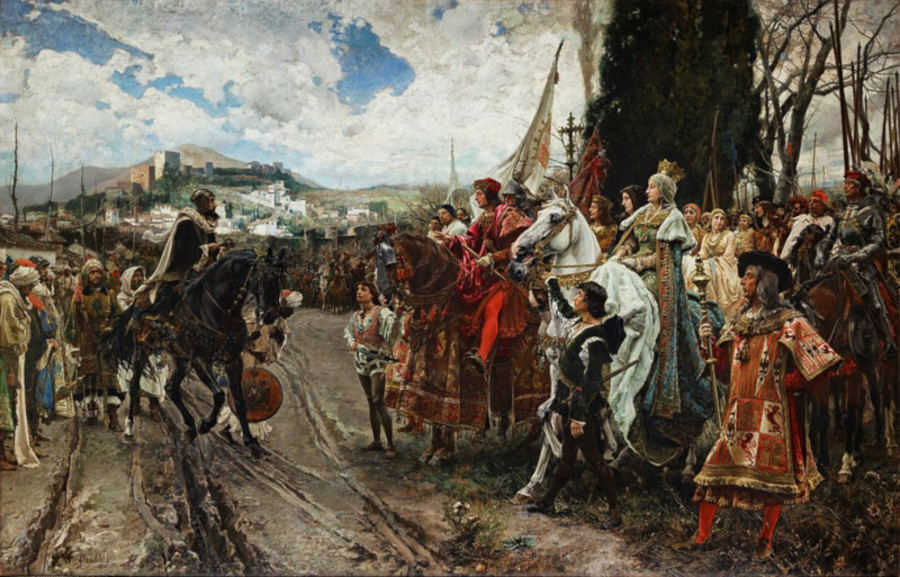Conferences and debates
Index / Activities / Conferences and debates / Views of Al-Andalus in Cinema and History
Views of Al-Andalus in Cinema and History
January 28, 2020From 10:00 a.m. to 12:00 p.m.
MADRID
Casa Árabe Ambassadors’ Hall (at Calle Alcalá, 62, First Floor).
From 10:00 a.m. to 12:00 p.m.
Free entry until the event’s capacity is reached.
On Tuesday, January 28, we will be hosting this dialogue between
Egyptian filmmaker Khaled Youssef and historians Alejandro
García-Sanjuan (University of Huelva) and Elizabeth Drayson (Cambridge
University).
At this round table discussion, the three participants will be debating the way in which Al-Andalus is portrayed and understood through different historiographical perspectives and traditions, within the framework of the preparation of his new film set during the fall of Granada in 1492.
Event information sheet
The event has been organized on the occasion of the visit by the Egyptian filmmaker to Casa Árabe to present his film “Karma“ and as part of the holding of the seminar titled “Dialogues on the Late Medieval Mediterranean: Meetings and discussions on methodology,” held by IS-LE COST Action and hosted by Casa Árabe the day before.
Originally a student of Youssef Chahine, Khaled Youssef was his main assistant for ten years, being the executive director and screenwriter for all of his internationally acclaimed films. Within his extensive film-making career, he worked with Chahine as a screenwriter for the movie Al Masiir (Destiny, Egypt, France, 1997), about the life of Andalusian philosopher Averroes, set in Al-Andalus during the twelfth century. In addition to his many other awards and nominations, two of his films were ranked among the best 100 Arab films of all time by the Dubai International Film Festival (2013).
Alejandro García Sanjuán has a PhD in Medieval History from the University of Seville (1998) and is a tenured professor of Medieval History at the University of Huelva (since 2008). His research focuses mainly on the history of Al-Andalus, and in particular on studying the Islamic legal framework for relations between Muslims and non-Muslims, as well as the way in which the concept of Al-Andalus has been viewed in contemporary Spanish historiographical and cultural tradition. His latest publications include Coexistencia y conflictos. Minorías religiosas en la Península Ibérica durante la Edad Media (Co-existence and Conflicts: Religious minorities on the Iberian Peninsula in the Middle Ages, 2015), La conquista islámica de la Península Ibérica y la tergiversación del pasado (The Islamic Conquest of the Iberian Peninsula and Misrepresentation of the Past, 2013) and Till God Inherits the Earth: Islamic Pious Endowments in Al-Andalus (10th-15th centuries) (2007).
At Cambridge University, Elizabeth Drayson is the Lorna Close Fellow in Spanish at Murray Edwards College, a professor of Spanish at Peterhouse and an affiliate professor with the Department of Spanish and Portuguese. She is s specialist on medieval literature and early modern Spanish and cultural history, as well as on the relations between the Arab, Jewish and Christian cultures during the medieval and late medieval periods. She produced the first translation and edition of the Libro de buen amor (The Book of Good Love) by Juan Ruiz (known as the “Archpriest of Hita”) to come out in England. Some of her most notable recent works include The Moor’s Last Stand: How seven centuries of Muslim rule in Spain came to an end (2017), El último sultán. Boabdil y el fin de Al-Ándalus (The Last Sultan: Boabdil and the end of Al-Andalus, 2018), translated into Spanish, and Granada: Spain’s Lost Paradise (2020, currently at press).

